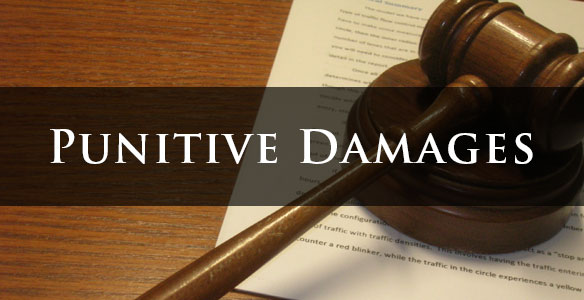One of the questions I am often asked by new clients about their Clearwater car accident cases is whether they can obtain punitive damages against the person who caused their accident. The answer is “it depends”. Punitive damages exist to punish a defendant for behavior that is much worse than ordinary negligence. Punitive damages are generally only allowed when a defendant engages in conduct which is fraudulent, malicious, deliberately violent or oppressive, or committed with such gross negligence as to indicate a wanton disregard for the rights of others.
As Florida Statute §768.72 provides, a claim for punitive damages may be asserted if there is a reasonable showing by record evidence or by proffer that would provide a reasonable basis for recovery of such damages. Should the court find that such evidence supports an award of punitive damages, the issue then becomes one for the jury to decide. See Johns-Manville v. Jansens, 463 So.2d 242 (Fla. 1st DCA 1984).
Not all states recognize punitive damages; however, in the state of Florida, a plaintiff may be awarded punitives if she can show that the defendant was guilty of either “intentional misconduct” or “gross negligence.” Florida law defines “intentional misconduct” as the defendant having “actual knowledge of the wrongfulness of the conduct and the high probability that injury or damage to the claimant would result and, despite that knowledge, intentionally pursued that course of conduct, resulting in injury or damage.” Fla. Stat. §768.72(1)(a).
It is not necessarily required that the plaintiff show that the defendant intended to cause the specific injuries that the plaintiff suffered. Rather, it is enough to show that the defendant willfully pursued a course of action that would likely result in some potential harm to the plaintiff. Johns-Manville v. Jansens, 463 So.2d at 247.
On the other hand, and to a slightly lesser degree, “gross negligence” is defined as conduct that is “so reckless or wanting in care that it constitutes a conscious disregard or indifference to the life, safety, or rights of persons exposed to such conduct.” Fla. Stat. §768.72(1)(b).
If the jury, based on clear and convincing evidence, finds that the defendant was personally guilty of “intentional misconduct” or “gross negligence,” then the defendant may ultimately be held liable for punitive damages. In Florida, however, unless the defendant’s intentional misconduct was motivated purely by the opportunity for financial gain, the award of punitive damages in a personal injury case will be capped at the greater of either three times the amount of compensatory damages or $500,000.
Over the past decade, due to new technology (Skype, FaceTime, texting, etc.) punitive damages for using technology while driving (which results in a crash) is an emerging area of the law. At least one court in Florida has allowed Punitive Damages to be added to a Complaint where a driver caused an accident while texting and driving.
Attorney Chelsie M. Lamie is a personal injury attorney located in Safety Harbor, Florida. If you or a loved one have been injured in a car accident or slip and fall accident, please call 727-501-3464 for a free consultation. You can also learn more about Attorney Lamie at www.chelsielamie.com.

